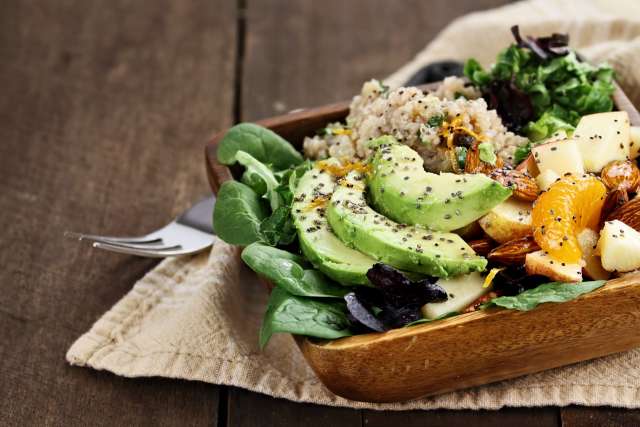Want some food for thought? Eating certain foods and getting the proper nutrients may help boost your focus and reduce symptoms of attention deficit hyperactivity disorder (ADHD).
While there are no official dietary guidelines for people with ADHD, experts know that dietary habits play a role in brain development, physiology and functioning. At this time, research specifically studying the association between ADHD and dietary patterns is inconclusive. However, experts have drawn some preliminary connections between what you eat and how well you focus.
Whether you want to supplement your ADHD medication or need a focus boost, here’s what you should know about ADHD and what you eat:
ADHD and your diet
People with ADHD should follow the same general dietary recommendations as everyone else:
- Eat a balanced, whole-food diet to ensure the brain gets all the nutrients it needs to perform at its best.
- Stay hydrated to keep the brain functioning smoothly, since the brain is 75% water.
Within those recommendations, some food choices may be better for focus and attention than others — for children and adults. The best foods for focus may be:
Fruits and vegetables
Research shows that eating more produce correlates to fewer ADHD symptoms. One study of children and adolescents reports that the less fruit and vegetables you eat, the more severe your ADHD symptoms can be.
Fruits and vegetables are excellent sources of vitamins and minerals critical for brain health. Specifically, vitamins and minerals help balance and maintain the brain’s neurotransmitters, chemicals responsible for communication between brain cells and essential in maintaining attention.
Complex carbohydrates
All carbohydrates turn into glucose (blood sugar) and are used for energy. But complex carbohydrates — starches such as beans, whole grains and vegetables — take longer to digest and convert to glucose. That’s good news for people with ADHD. Complex carbohydrates may keep you full for longer, allowing you to stay focused and attentive.
Protein
Protein has a direct effect on the brain. It provides the amino acids necessary for neurotransmitters and helps manage chemical imbalances that may be linked to ADHD.
Like complex carbohydrates, foods high in protein, such as lean meats and nuts, take a while to digest and keep you full. Protein also helps balance blood sugar, so if you are eating a meal high in sugar or simple carbohydrates, make sure to add some protein.
Omega-3 and omega-6 fatty acids
These fatty acids support heart health, memory and immune function. Studies also find that omega-3 and omega-6 fatty acids show promise for improving hyperactivity, impulsivity and attention. For some people, fatty acids may be an effective adjunctive therapy to traditional medications.
While omega-3 supplements (fish oil) are available, you can get this nutrient through your diet. Aim to eat oily fish rich in omega-3s, such as salmon, mackerel or sardines, twice a week. You can also get fatty acids daily from seeds, such as flaxseeds and chia seeds.
Iron, zinc and magnesium
Researchers studying nutrient deficiencies and their impact on ADHD symptoms found that iron, zinc and magnesium have the strongest association. All three minerals are involved in regulating or making the neurotransmitters that affect attention and concentration.
In a study of children and adolescents, low iron and zinc levels correlated to a lower capacity to focus and higher levels of hyperactivity. Adding more zinc and iron improved ADHD symptoms, though zinc had a more significant effect. Magnesium tends to have a calming effect on the brain.
The best way to get these minerals is through your diet. All three are plentiful in lean meats, seafood, nuts, soy and fortified cereals. If you are deficient in any of these minerals, your primary care physician (PCP) may also recommend a multivitamin.
Foods to avoid with ADHD
Common ADHD medications can suppress your appetite, and when those drugs wear off, you may find yourself so hungry you’ll reach for anything, healthy or not. Even if you aren’t taking ADHD medication, you may choose unhealthy foods high in additives and sugar because they can trigger a surge of dopamine — the brain chemical associated with pleasure and similar to a stimulant.
Next time you grab a quick, unhealthy fix, consider how your food might affect your focus. The Attention Deficit Disorder Association (ADDA) recommends that people with ADHD avoid certain foods, including:
- Caffeine, which is a stimulant that can be counterproductive for people struggling with hyperactivity
- Foods high in additives, which may interfere with neurotransmitters in the brain and increase ADHD symptoms
- Refined simple carbohydrates, such as baked goods and bread containing sugar and white flour, which can cause rapid blood sugar spikes and increased hyperactivity
- Unhealthy fats, such as saturated and trans fats, which can negatively impact brain function
Remember, no food or diet should replace recommended ADHD treatment. Your PCP can provide dietary recommendations based on your overall health, treatment and goals.



